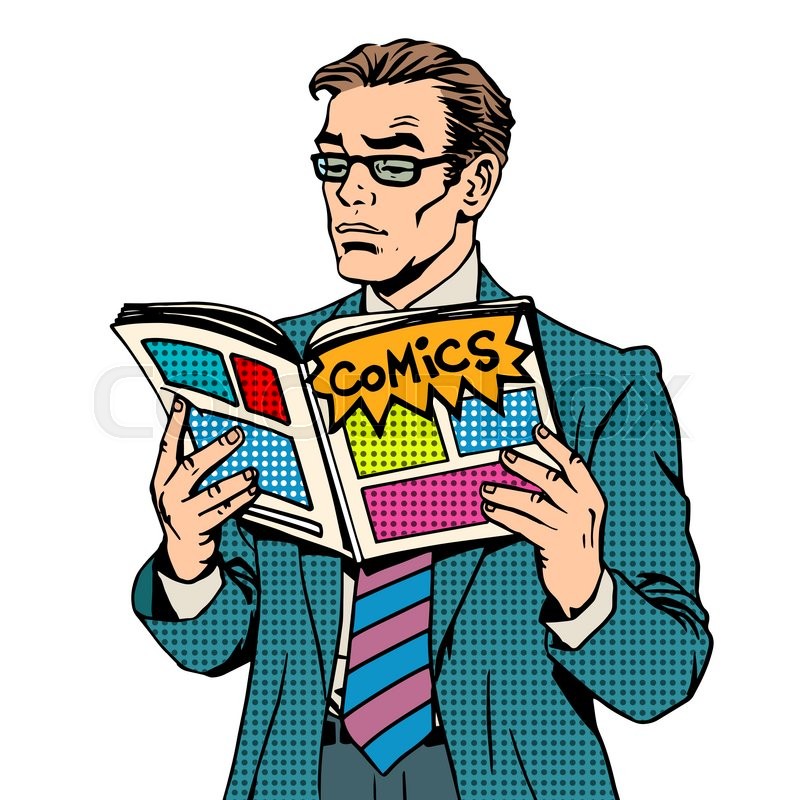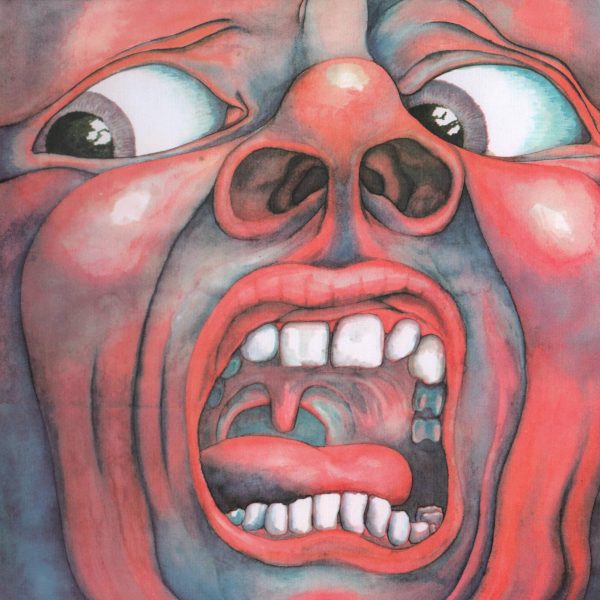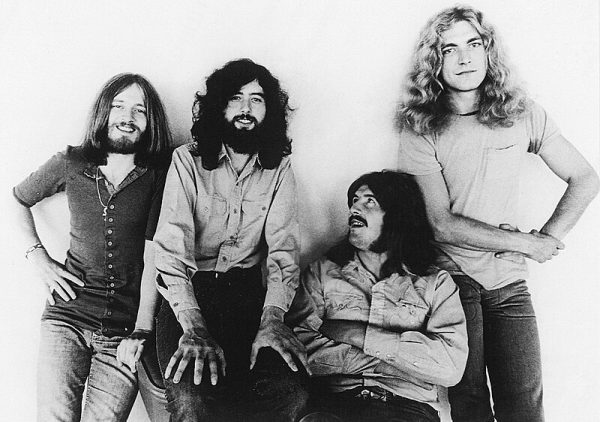Comic Books Have Always Been – And Always Will Be – Political
In recent years, I’ve seen an influx of people complaining about the inclusion of politics and political opinions in their favorite comic books. Oftentimes, this has to do with the representation of marginalized groups and “wokeness”. They claim that it wasn’t always so controversial and that comics are an escape from our reality. However, this isn’t the case. Since their inception, comic books have been entwined in politics, both in them and surrounding them. Art itself is inherently political; the beliefs of the creator impact the art even in ways that may not be obvious.
When discussions of politics come up, especially relating to media, it almost always ends up at diversity. Each time a new character is introduced as LGBTQ, a person of color, or any other minority, people come out of the woodwork to complain. This has been extra evident with the release of Superman: Son of Kal-El and the decision to make Jonathan Kent, the Superman in question, bisexual. Many people have had a negative reaction to this, despite this detail barely being part of the story so far. Most of these reactions are based on hate and simple anger at a character being different. That isn’t to say that there aren’t valid concerns about the quality of representation comics provide. However, these identities in and of themselves shouldn’t be considered political. Our world is full of all different types of people, and their inclusion should not be a debate.
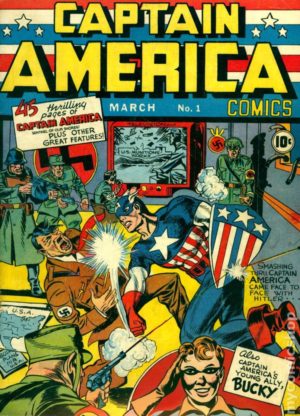
To start off, no discussion of politics in comics would be complete without Captain America. He was created by Jack Kirby and Joe Simon, both of whom were Jewish. They had been following the news of what was happening in Europe and decided to create a hero that would encourage Americans to get involved. He has become a recognizable symbol of America and its ideals. Naturally, he has been surrounded by politics since his first appearance.
Let’s talk about that first appearance. In March of 1941, Marvel Comics released Captain America #1. On the cover of this issue was Captain America punching Hitler in the face. While hopefully nowadays being against Nazis isn’t really a political stance, at the time this was released the cultural climate was very different. According to a retrospective by ABC News, this was a fairly controversial move. At the time this was published, America was desperately trying to stay out of World War 2. Many Americans either didn’t understand what the Nazis were doing, or agreed with them. According to Marvel’s vice president of publishing, Tom Brevoort, “It’s kind of difficult in the context of today to remember what a provocative image [that front cover] was. In a modern-day context, this is like Cap punching [Angela] Merkel in the face — this was a sitting head of state of another country.” One of the most popular and recognizable characters of this day and age was specifically created to share a political view, and this idea isn’t uncommon.
Let’s look at another example, this time from slightly more recently.
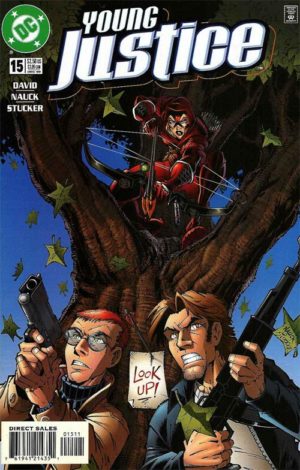
In the late 90’s and early 2000’s, author Peter David and artists Todd Nauck and Lary Stucker created Young Justice, a comic that followed a number of sidekicks and teen heroes. Aimed at mostly teenage boys, the comic didn’t take much seriously and was fairly lighthearted and funny. However, in December of 1999, issue 15 was released and introduced an arc that took a much different tone. In this issue, we follow Arrowette, or Cissie King-Jones, as we jump between the present day and flashbacks to moments in her past. These flashbacks tell the story of her relationship with her guidance counselor, who served as a maternal figure while Cissie’s mother was in and out of jail repeatedly. Cissie slowly realizes that Marcey, her counselor, is being abused by her fiance. This all builds up to when Cissie arrives at school one day and finds that Marcey had been shot and killed by her fiance when she attempted to leave the relationship.
The biggest way this arc differentiated from other PSA-like stories and one-off comic issues about political issues was that it had actual ramifications throughout the series. The arc itself lasted from issue 15 to issue 19, but it planted seeds that affected the greater story practically up until the end. This was somewhat out of character for such a quick-paced comic.
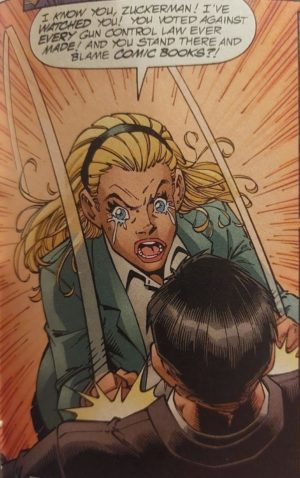
The reaction to issue 15 was mixed, to say the least. In issue 19, a number of letters regarding previous issues were published at the end of the comic. It seems like people were split into two distinct sides; those who disagreed with the message and those who wholeheartedly supported it. I want to highlight two letters in particular with polar opposite reactions. One letter stated “As a Canadian living in the US, I’m constantly amazed by this country’s love of firearms. The rhetoric one hears from all sides is just plain ridiculous…When Cissie shouted ‘It’s the guns, you idiot!’, I was cheering her on.” Another individual wrote in to say, “After reading Young Justice #15, I was given a clearer picture of [the author], Mister David, one that I will not support…Gun control is not the answer.”
The thing I find most interesting and almost surreal about these responses is that they are the same exact arguments people are having today, over 20 years later. This issue has always been around, and it would be remiss to ignore such an issue in a comic meant to relate to teens.
That’s really what it boils down to. Comics have always been meant to relate to the people reading them. You’re supposed to look up to characters like Superman, see yourself in characters like Robin, and be able to relate their world to yours even if there are some big differences. Our world is drenched in politics. It’s practically impossible to avoid them. Crime, law, weapons, government bodies, and more. These things are realities of our world, as well as staples of comic books. Additionally, it’s nearly impossible to stay neutral when creating art, just as Captain America was a reflection of his creator’s beliefs about war and Young Justice dealt with its’ author’s views on many topics.
I may not have changed any minds with this article, but I hope to at least shed some light on this not-so-new controversy. It’s important to have opinions and to share them, and art, in general, is a good way to do that. I hope to see more new and exciting comic books in the near future, including the discussions and opinions that they will bring to the table.



